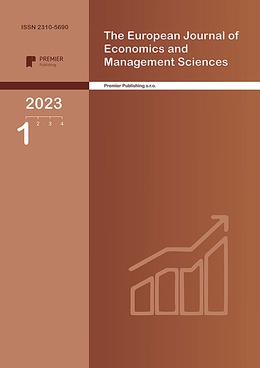Accrual Accounting Change in Greek Public Sector : a Reformation for Modernizing and Harmonizing Public Sector Accounting
Authors
Goumas Spyridon, Pavlos Karastogiannis

Share
Annotation
In Greece, with Presidential Decree 54/2018 was legislated the introduction and application of the accrual accounting basis for all entities of the General Government from 1/1/2025 as thus there will be objective information of the financial position and performance of each entity and financial statements will be homogeneous. Employees of the General Government need to be trained in the new accounting framework either through seminars or university programs an addition and it is necessary to hire employees with knowledge of accrual accounting. Successful implementation requires cooperation among employees, a change in employee mentality and culture and an appropriate information system that will provide immediate and reliable accounting information.
Keywords
Authors
Goumas Spyridon, Pavlos Karastogiannis

Share
References:
[1] Allain E., Lemaire C. & Lux G. (2021). Manager’s subtle resistance to neoliberal reforms through and by means of management accounting. Accounting, Auditing and Accountability Journal, 34 (3) 591-615. https://doi.org/10.1108/AAAJ-12-2018-3799
[2] Askounis, D., Ergazakis, K., Mavri, M., & Toska, A. (2016). Estimating the performance of local authorities as a measure to overpass the financial crisis: the Greek case study. International Journal of Public Administration, 39(14), 1109-1124. https://doi.org/10.1080/01900692.2015.1068326
[3] Brusca, I., Gomez-Villegas, M. & Montesinos, V. (2016). Public financial management reforms: the role of IPSAS in Latin-America. Public Administration and Development, 36 (1), 51–64. https://doi.org/10.1002/pad.1747
[4] Brusca, I. & Martínez, J. (2016). Adopting International Public Sector Accounting Standards: a challenge for modernizing and harmonizing public sector accounting. International Review of Administrative Sciences, 82 (4), 724-744. https://doi.org/10.1177/0020852315600232
[5] European Commission. (2013) Towards implementing harmonized public sector accounting standards in Member States. Retrieved from https://www.iasplus.com/en/news/2013/06/eurostat-conference. Accessed November 28, 2022.
[6] Chytis, E., Georgopoulos, I., Tasios, S.& Vrondou, I. (2020). Accounting reform and IPSAS adoption in Greece. European Research Studies Journal, 23(4), 165-184. https://doi.org/10.35808/ersj/1678
[7] Cohen, S., Manes Rossi, F., Caperchione, E. & Brusca, I. (2021). Debate: If not now, then when? Covid-19 as an accelerator for public sector accrual accounting in Europe. Public Money & Management, 41(1), 10-12. https://doi.org/10.1080/09540962.2021.1834714
[8] Cohen, S. & Karatzimas, S. (2017). Accounting information quality and decision usefulness of governmental financial reporting. Moving from cash to modified cash. Meditary Accounting Research, 25(1), 95-113. https://doi.org/10.1108/MEDAR-10-2015-0070
[9] Cohen, S. & Karatzimas, S. (2016). Modernizing government accounting standards in Greece: a case of ‘garbage can’ decision-making. Public Money & Management, 36(3), 173-180. https://doi.org/10.1080/09540962.2016.1133966
[10] Cohen, S., Kaimenakis, N. & Venieris, G. (2013). Reaping the benefits of two worlds: An explanatory study of the cash and the accrual accounting information roles in local governments. Journal of Applied Accounting Research, 14(2), 165–179. https://doi.org/10.1108/09675421311291900
[11] Cohen, S. (2012). Cash versus accrual accounting measures in Greek municipalities: proxies or not for decision-making?. International Journal of Accounting, Auditing and Performance Evaluation, 8(3), 203-222. https://doi.org/10.1504/IJAAPE.2012.047807
[12] Christensen, M. (2002). Accrual Accounting in the Public Sector: The Case of the New South Wales Government, Accounting History, 7(2), 93-124. https://doi.org/10.1177/103237320200700205
[13] Connolly, C., & Hyndman, N. (2006). The actual implementation of accruals accounting: Caveats from a case within the UK public sector. Accounting, Auditing & Accountability Journal, 19(2), 272–290. https://doi.org/10.1108/09513570610656123
[14] Creswell, J. W. (2011). Educational Research: Planning, Conducting, and Evaluating Quantative and Qualitative Research. New Jersey: Pearson Education International.
[15] Domingues, R., Lozano, R., Ceulemans, K. & Ramos, B. (2017). Sustainability reporting in public sector organisations: Exploring the relation between the reporting process and organisational change management for sustainability. Journal of environmental management, 192, 292-301. https://doi.org/10.1016/j.jenvman.2017.01.074
[16] European Commission. (2013) Towards implementing harmonized public sector accounting standards in Member States. Retrieved from https://www.iasplus.com/en/news/2013/06/eurostat-conference. Accessed December 28, 2022.
[17] Hyndman N. & Connolly C. (2011). Accruals Accounting in the Public Sector: A Road Not Always Taken. Management Accounting Research, 22 (1), 36-45. https://doi.org/10.1016/j.mar.2010.10.008
[18] Jones, R. (1992). The Development of Conceptual Frameworks of Accounting for the Public Sector, Financial Accountability and Management, 8(4), 249-264. https://doi.org/10.1111/j.1468-0408.1992.tb00442.x
[19] Newberry, S. (2014). The use of accrual accounting in New Zealand’s central government: Second thoughts. Accounting, Economics and Law, 4(3), 283-297. https://doi.org/10.1515/ael-2014-0003
[20] OECD. (2017). Accrual Practices and Reform Experiences in OECD Countries, Retrieved from https://www.oecd.org/publications/accrual-practices-and-reform-experiences-in-oecd-countries-9789264270572-en.htm. Accessed Decemder 2, 2022.
[21] Presidential Decree no. 54/2018. Specifications and timeline of the Chart of Accounts of the General Government. GG 103 A 13-06-2018.
[22] Robson, C. (2010). Real-World Research—A Tool for Social Scientists and Professional Researchers (Translated by Dalakou, V., Vasilikou, K.). Gutenberg (2007 Edition), Athens.
[23] Rodosthenous, Μ., Goumas, S & Gasteratos, I. (2016). The Adoption of International Financial Reporting Standards (I.F.R.S) and International Standards of Auditing (I.S.A) is required to fight shadow economy repercussions. Archives of Economic History, 28(1), 77-96.
https://archivesofeconomichistory.com/webdata/magaz/092016160235_Volume%20XXVIII_No.1_2016.pdf
[24] Rossi, F. M., Cohen, S., Caperchione, E., & Brusca, I. (2016). Harmonizing public sector accounting in Europe: thinking out of the box. Public Money & Management, 36(3), 189-196. https://doi.org/10.1080/09540962.2016.1133976
[25] Stamatiadis, F. (2009). Investigating the Governmental Accounting Reform of Greek National Health System (ESY): Some preliminary evidence. International Journal on Governmental Financial Management, 9(2), 73-97. https://mpra.ub.uni-muenchen.de/id/eprint/19649
[26] Veggeland, N. (2015). Accounting in the Public Sector. Journal οf Business Management and Economics, 3(2), 34-37. https://doi.org/10.15520/jbme.2015.vol3.iss2


